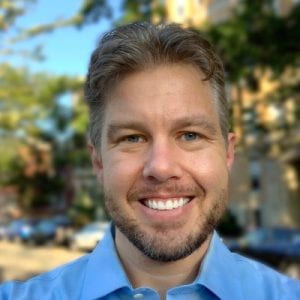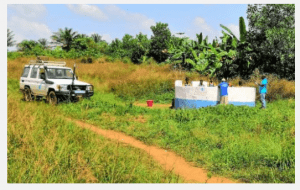When I first heard that my degree program had a virtual PR firm, I was skeptical. I mistakenly thought work with Husky Communications was purely voluntary and didn’t count for course credit. I also assumed, incorrectly, that when the clients were real and the stakes were higher than an individual course grade, students would only be trusted with unchallenging busywork.
 Yet I was a mid-career professional who became a full-time graduate student largely out of necessity (thank you, pandemic). I vastly preferred learning through real-world experience over textbooks and hypothetical exercises, so I shudder to think of the opportunity I might have missed if Professor Ed Powers hadn’t visited my Intro to PR class to tell us all about Husky Communications, a visit that thankfully cleared up my misconceptions.
Yet I was a mid-career professional who became a full-time graduate student largely out of necessity (thank you, pandemic). I vastly preferred learning through real-world experience over textbooks and hypothetical exercises, so I shudder to think of the opportunity I might have missed if Professor Ed Powers hadn’t visited my Intro to PR class to tell us all about Husky Communications, a visit that thankfully cleared up my misconceptions.
Professor Powers explained that participation in the firm was integrated into four sequential PR courses (PBR 6710, 6135, 6130, 6140) which equated to the phases of research, strategy development, content development, and advanced content development that typically play out in a professional PR firm when it ramps up work for a new client. He further explained that if I took all four courses in sequence, I could work with the same client for 24 weeks.
I lit up at the prospect of working with a client for six straight months. That would be twice as much client time as I’d have in my capstone course! And I’d be gaining 12 course credits in the process.
Now that I knew I’d have time to develop my relationship with, my understanding of, and my ideas for the client, I could envision doing work that was truly valuable… work that I’d want to boast about in my next job interview. I was in.
That was six months ago. Last week, I wrapped up my work in the final course and, consequently, my work with the client.
Did the experience meet my high expectations? It certainly did. That’s why I’m writing this article to my fellow students in the Corporate and Organizational Communication program: I want to encourage all of you, even those not concentrating in PR, to take advantage of our program’s richest experiential opportunity.
Research and discovery with my client
My assigned client was Akvo Foundation (“Akvo” for short). Akvo provided open-source data tools and expertise to international development programs in Africa. Armed with better data, these programs could, for example, improve access to safe to drinking water for more people, increase yields for smallholder farmers, and do all sorts of inspiring things. I’d written a lot about social innovation in previous jobs, so for me, Akvo was the perfect client. Moreover, while they had a strong communications operation in place, they also faced clear challenges and were genuinely seeking our help.
 The research phase (PBR 6710, taught by Professor Ed Powers) was often overwhelming. Our nine-person team split up into four different directions to cobble together as much knowledge as possible about the client and all the relevant context. Understanding what Akvo did was straightforward enough, but understanding how they did it was a gradual, daunting process. As I wrestled to understand Akvo’s complexities, I sometimes doubted whether we’d ever truly understand the client well enough to provide insights of real value.
The research phase (PBR 6710, taught by Professor Ed Powers) was often overwhelming. Our nine-person team split up into four different directions to cobble together as much knowledge as possible about the client and all the relevant context. Understanding what Akvo did was straightforward enough, but understanding how they did it was a gradual, daunting process. As I wrestled to understand Akvo’s complexities, I sometimes doubted whether we’d ever truly understand the client well enough to provide insights of real value.
It did help that our sponsor at Akvo, Georgia Walker, was deeply invested in the process of working with a student agency. She started us off with a substantive overview of the organization and its communication programs, and for the next several weeks made herself available for the torrent of questions we had.
Our persistence and Georgia’s generosity did begin to pay off, and by the end of the course we had identified a few key research insights that we wanted to incorporate into our strategy during the next course.
Moveover, I finally began to feel confident that I would indeed have valuable insights for the client as our work together progressed.
Leading a team and crafting a strategy
In the strategy development phase (PBR 6135, taught by Professor Kirsten Whitten) I volunteered to serve as PR Director for our now-seven-person team. The responsibilities were light at first, but in the latter weeks the role became quite time-consuming. Prepping to run team meetings and coordinating the work in between meetings required a lot of attention. But I was proud of the experience, and I suspected it paralleled the real-world equivalent of leading a team within a professional PR agency.
I was also proud that my personal priority for Akvo—to supplement their content with narratives that would resonate with a non-industry audience—featured heavily in our strategic plan.
Finally, I was proud—and a little nervous—that my preferred content project for the next two courses had been approved. I was going to help Akvo’s cofounder write an op-ed!
Because an op-ed would be time-intensive and require a lot of trust, I had to first win support from Professors Whitten and Powers, who it turns out were incredibly supportive (they always were). They, in turn, pitched the project to Georgia Walker, who approved it and suggested having Akvo’s cofounder Jeroen van der Sommen serve as author.
Developing trust (and a killer op-ed)
In the content development phase (PBR 6130 & 6140, co-taught by Professors Ed Powers and Christina Inge), I began to work more closely with our sponsor Georgia Walker. I prepped for meetings, took meticulous notes, and followed up regularly with reflections, updates, and other intermediary steps. Our warm and increasingly productive suggested to me that I’d won a lot of confidence and trust from her. She repeatedly expressed how excited she was about the op-ed—until now they hadn’t written any opinion pieces for external publication
 Eventually, I interviewed Jeroen, Akvo’s cofounder. For me, this was a stimulating and familiar challenge. Like many thought leaders I’d worked with at past jobs, his ideas were complex, and he offered far more material than could fit into a 900-word article. He rarely paused for long between thoughts, which meant I had to get comfortable interrupting him to ask clarifying questions or pivot to new topics. Thankfully, he was amenable to this. When I did interrupt him, I tried to echo some of what he’d already explained to me so that he would trust I was interested in his thinking and able to keep up. I could tell he really enjoyed voicing his ideas to others, and this motivated me to do them justice on the written page.
Eventually, I interviewed Jeroen, Akvo’s cofounder. For me, this was a stimulating and familiar challenge. Like many thought leaders I’d worked with at past jobs, his ideas were complex, and he offered far more material than could fit into a 900-word article. He rarely paused for long between thoughts, which meant I had to get comfortable interrupting him to ask clarifying questions or pivot to new topics. Thankfully, he was amenable to this. When I did interrupt him, I tried to echo some of what he’d already explained to me so that he would trust I was interested in his thinking and able to keep up. I could tell he really enjoyed voicing his ideas to others, and this motivated me to do them justice on the written page.
I wrote a first draft that pleased both Georgia and Jeroen, and in a lengthy follow-up meeting we discussed their concerns and feedback. In most cases I was able to suggest changes they liked, but I also felt comfortable enough with both of them to occasionally push back when I felt the change they wanted wouldn’t move the article in the right direction.
The op-ed is currently under review at Devex, a prominent media platform for the global development community. At the time of this writing, I am working with one of the editors on some revisions to the piece that will hopefully result in its acceptance.
Regardless of where it ends up, this article and everything leading up to it represents my proudest work since starting my degree program. I’m deeply grateful to my team, to Georgia and Jeroen at Akvo, and to Professors Powers, Inge, and Whitten for their support and trust in helping me to pursue this project.
Being part of a PR Firm
In my professional experience I have mostly served as part of a small, in-house communications team. I’d never worked for a communications or PR agency before, and my sense from working at Husky Communications is that it accurately reflected the “feel” of working for a real agency, especially the energy that accompanies taking on a new client—that collective, frenetic scramble to understand the client well enough to begin providing value as quickly as possible.
I admit, such pacing was not to my taste. I prefer working at a steadier clip, focusing on one client (my employer), and developing collaborative relationships over a period of months rather than days. This is one of the reasons why I don’t think I would prefer working at an agency in general. And yet, I have more confidence now that I could work at an agency if circumstances demanded it, or if I encountered an opportunity with an agency that seemed like an especially good fit.
Alternatively, I can also now envision a scenario in which I seek the services of a PR agency to help increase my capacity as an in-house communicator. For instance, if I encounter communication challenges that are far outside my area of expertise or are simply too large for my team to handle without support, hiring an agency might be the solution. Thanks to my Husky Communications experience, I now have a stronger sense of what expect from an agency and how best to work with them.
To recap: If you’re a new student in the Corporate and Organizational Communication degree program, I urge you to consider joining Husky Communications by enrolling in the associated courses (PBR 6710, 6135, 6130, and 6140), and to take all four courses in sequence if possible so you can work for an extended period with the same client. It may turn out to be the most valuable experience you have at Northeastern. And in the unlikely event you don’t find it as valuable as I did, don’t worry, you’ll at least be getting plenty of course credit.
Posted by Jim Cooney, CPS’21
Addendum
I’m please to report that Devex ultimately published the op-ed! (You can read it here). The process involved a lot of back and forth with the reviewing editor—including two more rounds of revision—spread out over 6-7 weeks. I’ve never encountered a submission process this long for an opinion piece, so I guess we can count it as just the latest learning experience on my Husky Communications journey. While the suspense nearly killed me, I’d much prefer a lengthy exchange with an editor who is particular about what he/she wants than a quick rejection with no feedback (which is quite common). I hope this publication marks the beginning of a productive relationship between Akvo and Devex — that would be a powerful channel indeed.